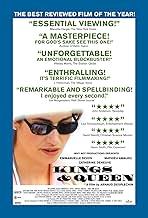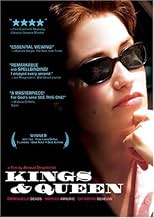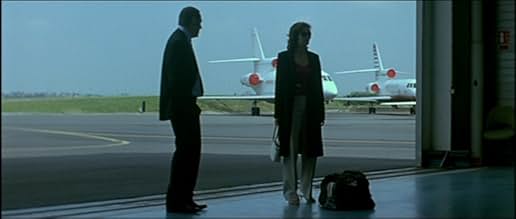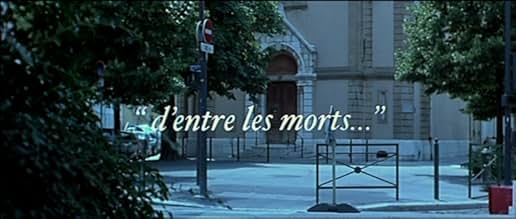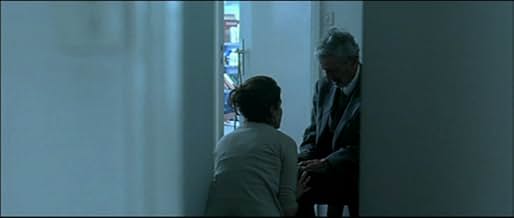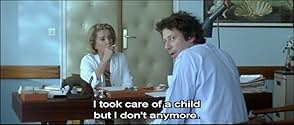Rois et reine
- 2004
- Tous publics
- 2h 30min
NOTE IMDb
7,0/10
4,1 k
MA NOTE
Ajouter une intrigue dans votre langueParallel storylines tell the current state of affairs for two ex-lovers: Nora's a single mother who comes to care for her terminally ill father; holed in up in mental ward, Ismael, a brillia... Tout lireParallel storylines tell the current state of affairs for two ex-lovers: Nora's a single mother who comes to care for her terminally ill father; holed in up in mental ward, Ismael, a brilliant musician, plots his escape.Parallel storylines tell the current state of affairs for two ex-lovers: Nora's a single mother who comes to care for her terminally ill father; holed in up in mental ward, Ismael, a brilliant musician, plots his escape.
- Réalisation
- Scénario
- Casting principal
- Récompenses
- 9 victoires et 18 nominations au total
Avis à la une
Nora (the devastating and luminous Emmanuelle Devos) is a single mother who suddenly has to care for her dying father (a successful writer straining to put the finishing touches on his last book, a memoir of sorts) on the eve of marrying her new suitor. Ismael (the fantastic Mathieu Amalric) is her "ex-boyfriend" who cared for her son most of the boy's life, and is a struggling musician who suddenly finds himself trapped in the loony bin thanks to an over-zealous sister, a bitter friend, and a "judicial error." Director Desplechin (this is the only film I have seen of his) does a nice job flipping back and forth between the utter bleakness and emotional hell of caring for a dying parent, and the absurd serio-comic-horror of being stuck in the "crazy hospital" against your will.
There's a lot of play with psychoanalysis (highlighted by Catherine Denueve in a bit part as a psychiatrist) that is fun and illuminating to watch. There's speckles of romance, dark humor, nihilism, magic realism, and soap opera theatrics with lots of references to philosophy, mythology, and poetry that keep the film interesting and unpredictable even as its over two and a half hour run time tries your patience. There are plenty of revelations and big emotional payoffs here punctuated well with eclectic music choices (everything from classical pieces to some sort of catchy European hip-hop) and nice little surprises (Magalie Woch is delightful as the lovely suicidal mental patient who becomes smitten with Ismael). This utterly French film gives the viewer a lot to chew on, even if you have to gnaw through a bit of gristle before dining on the filet mignon.
There's a lot of play with psychoanalysis (highlighted by Catherine Denueve in a bit part as a psychiatrist) that is fun and illuminating to watch. There's speckles of romance, dark humor, nihilism, magic realism, and soap opera theatrics with lots of references to philosophy, mythology, and poetry that keep the film interesting and unpredictable even as its over two and a half hour run time tries your patience. There are plenty of revelations and big emotional payoffs here punctuated well with eclectic music choices (everything from classical pieces to some sort of catchy European hip-hop) and nice little surprises (Magalie Woch is delightful as the lovely suicidal mental patient who becomes smitten with Ismael). This utterly French film gives the viewer a lot to chew on, even if you have to gnaw through a bit of gristle before dining on the filet mignon.
"Kings and Queen (Rois et reine)" is a deceptively beautiful looking exploration of the differences between appearances and substance.
Our first impressions of each parallel character who seems to have no relation with any other character undergo a complete turn-around by the time we have finished circling around them in time and space at the end of the film, especially as we begin to realize they are unreliable, self-serving narrators of their own experiences.
Each person is part of a very modern blended family, both by genetics and selection, and faces the most quotidian of life cycle decisions -- life, birth, marriage, paying bills, parent/child responsibilities, Laingian sanity and particularly death -- and makes a different choice how to handle them, whether active or passive, peremptorily or as fate.
But each choice leads them to the next unexpected plateau of choices with guilt hanging on each move. For each, doing the right thing means something completely different as each responds differently to an emotional and physical crisis.
Though psychoanalysis is drolly mocked as just another philosophy, each character may be eccentric or seriously crazy and undergoes Freudian traumatizations by family in casually cruel ways that alternate between funny and shocking (and sometimes absurd).
Director/co-writer Arnaud Desplechin revels in the diversity of his characters, so that as their orbits collide they can hardly communicate because their frames of reference are so different.
The acting brilliantly matches the unexpected revelations that flash back to let us know how each character got to be this person and the transformations to where they are going. Emmanuelle Devos as "Nora" lusciously fills the screen even as we find that her nonchalant beauty masks the devastation she leaves in her wake as it helps her use others for her selfish needs.
Desplechin has frequently cited Woody Allen as an influence (and "Seinfeld"), and Mathieu Amalric's Ismaël is a tribute to that talkative, intellectual Jewish persona and Philip Roth is mentioned as well, though this character is much more up on hip pop music and surprisingly matures as he gains far more humanity than his New York inspirations.
The film is long and slow, but curiosity about how each character got to where the film started is involving.
It's impossible to keep up with all the erudite references to poetry (Desplechin says the title comes from a chess metaphor in a French poem: "King without kingdom/ Queen without a scene/ Castle broken/ Bishop betrayed/ Fool as a brave man"), literature, mythology, art, music and film ("Moon River" seems to be used frequently these days).
Eric Gautier's cinematography is sensual and is particularly dreamy when an awful event occurs.
The production design creates illustrative environments for each person and family, as every object around each character has ironic counterpoint to the dialog.
The soundtrack eclectically extends from electronica to klezmer to hip hop to singer/songwriters Paul Weller and Randy Newman to classical and more that reflect the characters' psychological mise en scenes.
Our first impressions of each parallel character who seems to have no relation with any other character undergo a complete turn-around by the time we have finished circling around them in time and space at the end of the film, especially as we begin to realize they are unreliable, self-serving narrators of their own experiences.
Each person is part of a very modern blended family, both by genetics and selection, and faces the most quotidian of life cycle decisions -- life, birth, marriage, paying bills, parent/child responsibilities, Laingian sanity and particularly death -- and makes a different choice how to handle them, whether active or passive, peremptorily or as fate.
But each choice leads them to the next unexpected plateau of choices with guilt hanging on each move. For each, doing the right thing means something completely different as each responds differently to an emotional and physical crisis.
Though psychoanalysis is drolly mocked as just another philosophy, each character may be eccentric or seriously crazy and undergoes Freudian traumatizations by family in casually cruel ways that alternate between funny and shocking (and sometimes absurd).
Director/co-writer Arnaud Desplechin revels in the diversity of his characters, so that as their orbits collide they can hardly communicate because their frames of reference are so different.
The acting brilliantly matches the unexpected revelations that flash back to let us know how each character got to be this person and the transformations to where they are going. Emmanuelle Devos as "Nora" lusciously fills the screen even as we find that her nonchalant beauty masks the devastation she leaves in her wake as it helps her use others for her selfish needs.
Desplechin has frequently cited Woody Allen as an influence (and "Seinfeld"), and Mathieu Amalric's Ismaël is a tribute to that talkative, intellectual Jewish persona and Philip Roth is mentioned as well, though this character is much more up on hip pop music and surprisingly matures as he gains far more humanity than his New York inspirations.
The film is long and slow, but curiosity about how each character got to where the film started is involving.
It's impossible to keep up with all the erudite references to poetry (Desplechin says the title comes from a chess metaphor in a French poem: "King without kingdom/ Queen without a scene/ Castle broken/ Bishop betrayed/ Fool as a brave man"), literature, mythology, art, music and film ("Moon River" seems to be used frequently these days).
Eric Gautier's cinematography is sensual and is particularly dreamy when an awful event occurs.
The production design creates illustrative environments for each person and family, as every object around each character has ironic counterpoint to the dialog.
The soundtrack eclectically extends from electronica to klezmer to hip hop to singer/songwriters Paul Weller and Randy Newman to classical and more that reflect the characters' psychological mise en scenes.
(San Francisco Film Festival showing, March 22, 2005) An amazing if somewhat indigestible film, Desplechin's KINGS AND QUEEN (Rois et reine) is a genre-bending family drama that alternates wired comedy with solemn tragedy, in particular nutty violist Ismaël's (Mathieu Amalric's) tax problems and sudden third-party commitment to a mental hospital and ex-girlfriend Nora's (Emmanuelle Devos') discovery that her writer father is dying of advanced stomach cancer. Meanwhile Nora is haunted by memories of the father of her young son Elias (Valentin Lelong), is about to marry a rich "gangster," and other relatives wander in and out of a tumultuous narrative which alternates present tense scenes with flashbacks, dreams and fantasies. Buffoonery and melodrama, which are sometimes hard to separate, turn out to work well together as director Desplechin modestly points out is true of Shakespeare, whose King Lear may have given him the idea for the brutal, vindictive final letter Nora's father, Louis Jenssens (Maurice Garrel) leaves for her. The audience at the SFFF cheered a gratuitous sequence where Ismaël's father Abel (Jean-Paul Roussillon) singlehandedly subdues three punks trying to rob his convenience store while Ismaël looks on with terror. In the next scene, father and son are lifting weights together at a health club. The plan by Abel, who was himself adopted, to adopt a man who's lived with him and his wife for years, over the protests of his adult children, rhymes palpably with the question of Ismaël's adopting Elias, who doesn't like Nora's new man, Jean-Jacques (Olivier Rabourdin). The long scene where Ismaël explains to Elias why he can't adopt him, while they walk through a museum, is one of a number of tours de force.
Secondary characters in this overwritten but always entertaining drama make themselves hard to forget though buffoonery in the case of the Ismaël's junkie lawyer (Hypolytte Girardot); though their neediness, in the case of Arielle, "la Chinoise" a flirtatious 'princess' at the psych hospital, (Magalie Woch) or Nora's sister down-and-out Chloé, (Nathalie Boutefeu); bitchiness in the case of Ismaë's sister. Ismaël's usual shrink is a huge African grande dame; he gets his entrance exam and his walking papers at the hospital from none other than Catherine Deneuve (whose iciness and soulfulness would be an unforgettable blend even if she were not already one of the world's most beautiful sixty-somethings). The women are goddesses, bitches, or queens. Ismaël says women have no souls; but the story's main men are talented but narcissistic problem children. Elias seems poised to grow up into one of those too. Most of the acting is remarkable, or at the very least arresting. The mercurial Amalric and lovely Devos completely live up to their top billing. Still, even their parts might have done with some trimming back.
The movie comes with allusions to Leda and the Swan, Nietsche, Yeats, Emily Dickenson, and a large number of musical references including rap (and a break dancing demo by Ismaël at the mental hospital), Klezmer, Randy Newman and, as a framing device, Moon River. Suspicions that there may be too much going on here are stifled by sheer pleasure in the drama of it all.
Six César nominations in France, where it opened in late 2004.
The title may refer to Shakespeare's plays, or to the way paterfamilias are seen by their children. "Kings and Queen" is wildly unedited and at 2 ½ hours definitely too long; Desplechin even acknowledged repeatedly that his answers to questions after the SFFF showing were too long too. But his inability to edit his work down may be hard to separate from his unique flavor and charm. Desplechin wrote the excellent screenplay for "Un monde sans pitié" ("A World Without Pity," 1989) the story of a fascinating young loser. "Desplechin is a wonder with actresses, at least as long as they're with him: Devos' character is close enough to 'My Sex Life' star and former Desplechin paramour Mariane Denicourt that she responded to the movie with a retaliatory roman à clef," writes Sam Adams in the Philadelphia City Paper. A question about this contretemps met with a flurry of interesting doubletalk from the soft-spoken director.
Secondary characters in this overwritten but always entertaining drama make themselves hard to forget though buffoonery in the case of the Ismaël's junkie lawyer (Hypolytte Girardot); though their neediness, in the case of Arielle, "la Chinoise" a flirtatious 'princess' at the psych hospital, (Magalie Woch) or Nora's sister down-and-out Chloé, (Nathalie Boutefeu); bitchiness in the case of Ismaë's sister. Ismaël's usual shrink is a huge African grande dame; he gets his entrance exam and his walking papers at the hospital from none other than Catherine Deneuve (whose iciness and soulfulness would be an unforgettable blend even if she were not already one of the world's most beautiful sixty-somethings). The women are goddesses, bitches, or queens. Ismaël says women have no souls; but the story's main men are talented but narcissistic problem children. Elias seems poised to grow up into one of those too. Most of the acting is remarkable, or at the very least arresting. The mercurial Amalric and lovely Devos completely live up to their top billing. Still, even their parts might have done with some trimming back.
The movie comes with allusions to Leda and the Swan, Nietsche, Yeats, Emily Dickenson, and a large number of musical references including rap (and a break dancing demo by Ismaël at the mental hospital), Klezmer, Randy Newman and, as a framing device, Moon River. Suspicions that there may be too much going on here are stifled by sheer pleasure in the drama of it all.
Six César nominations in France, where it opened in late 2004.
The title may refer to Shakespeare's plays, or to the way paterfamilias are seen by their children. "Kings and Queen" is wildly unedited and at 2 ½ hours definitely too long; Desplechin even acknowledged repeatedly that his answers to questions after the SFFF showing were too long too. But his inability to edit his work down may be hard to separate from his unique flavor and charm. Desplechin wrote the excellent screenplay for "Un monde sans pitié" ("A World Without Pity," 1989) the story of a fascinating young loser. "Desplechin is a wonder with actresses, at least as long as they're with him: Devos' character is close enough to 'My Sex Life' star and former Desplechin paramour Mariane Denicourt that she responded to the movie with a retaliatory roman à clef," writes Sam Adams in the Philadelphia City Paper. A question about this contretemps met with a flurry of interesting doubletalk from the soft-spoken director.
How do you create a follow up to the two masterpieces that were "Comment je me suis disputé" and "Ester Kahn" (we won't talk about the dull "Léo... en jouant Dans la compagnie des hommes") ? You just listen to what your heart has to say, however hard and difficult it might be, and make no compromises. You don't fear to be misunderstood. You care about the audience but do not let them influence your work. You're a genius but you still have doubts, and these doubts make your art even better. "Rois et Reine" ("Kings and Queen"), Arnaud Desplechin's latest film, lasts 2h40mn and, in spite of its length and its harsh contents, is utterly entertaining, fascinating, moving and even funny. It does not fear to be (often) irritating and boring : the burlesque moments, for instance, are quite annoying, but then again, that's a personal point of view. The thing is, the storyline about Nora's relationship with her father and her ex boyfriend and her son, and then again Ismael's relationship with Nora's son and with his family are so powerful, they don't need more. Unfortunately, Desplechin is often reluctant to cut deep in his movie and as a result, "Rois et Reine" sometimes looks like a long, long ride. Add to that some unfortunate flash backs burdened by bad acting (the character of Pierre) and boy does the movie sound dull at times. Emmanuelle Devos and Mathieu Amalric, finding here the roles of a lifetime, are absolutely fascinating. When in the end, Nora discovers the secret pages of her father's diary, or when Ismael spends an afternoon with Nora's son, it's devastating. I've rarely seen a movie that translates human emotions so beautifully. Just for that, "Rois et reine" is a must see.
The death of a loved one is never pretty, but may be particularly hard in our atomic age; the news of an ailing relative is a bolt from the blue, external to our everyday lives. And unlikely people can make good parents, exactly because being a good parent is not something you achieve by following instructions. These are the sort of thoughts provoked by watching 'Kings and Queen', a French movie about a woman with a dying father, a mad ex-lover and a teenage son. There are definitely some perceptive moments, but overall, the film is a bit uneven; the two halves of the plot (one centred on the woman and her father, the other on her ex) are quite disconnected and also distinct in tone: the former cool and reflective, the latter somewhat riotous; although they come together at the end, this doesn't quite feel like a necessary ending, while other plot lines (such as one centred on the lead character's sister) are not developed. Still, I liked the movie's insight into the selfishness of modern lives and attitudes, which fall short of evil but lie exposed as inadequate under duress: there's a message in this which many could heed.
Le saviez-vous
- AnecdotesThe title of the movie was inspired to Arnaud Desplechin by the five first lines of a poem by Michel Leiris: "Rois sans arrois Reine sans arène Tour trouée Fou à lier Cavalier seul"
- Citations
Nora Cotterelle: There are four men I loved. I killed two of them.
- ConnexionsReferenced in Trust the Man (2005)
- Bandes originalesPavane pour une Infante défunte
Composed by Maurice Ravel
Meilleurs choix
Connectez-vous pour évaluer et suivre la liste de favoris afin de recevoir des recommandations personnalisées
- How long is Kings & Queen?Alimenté par Alexa
Détails
Box-office
- Budget
- 3 871 153 € (estimé)
- Montant brut aux États-Unis et au Canada
- 290 973 $US
- Week-end de sortie aux États-Unis et au Canada
- 16 101 $US
- 15 mai 2005
- Montant brut mondial
- 3 839 556 $US
- Durée
- 2h 30min(150 min)
- Couleur
- Mixage
- Rapport de forme
- 2.35 : 1
Contribuer à cette page
Suggérer une modification ou ajouter du contenu manquant

